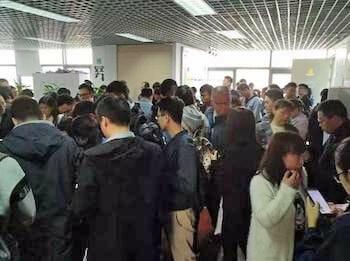
Grumpy customers occupied Haoyuan Hengye’s office late last month
Angry tenants and landlords occupied the Beijing office of Haoyuan Hengye Long Term Rental Apartment late last month to mount their own extra-legal detention of the housing company’s management.
The move against the rental housing operator was related to allegations that rental payments by tenants for their Haoyuan Hengye apartments had gone missing, with landlords reporting that the four year-old Beijing-based company had failed to meet its own rental obligations for use of their assets.
The ruckus at the rental housing company came less than one month after Yujian Apartment, a rental housing company backed by Xiaomi founder Lei Jun, was warned by a major bank after allegedly failing to meet its financial obligations to tenants and landlords, while a number of other rental housing firms have come under stress or closed down in recent months.
Collecting Rent Without Paying Landlords
The complaints against Haoyuan Hengye, which leases apartments long term from property owners, renovates them, and then sub-leases the units to tenants, centre on its failure to pay the home-owners, despite collecting rent from the tenants.
Haoyuan Hengye, which states a network of 100,000 bedrooms nationwide, but operates mainly in Beijing’s suburban districts, appears to have come despite, or perhaps because of, China’s central government making the multi-family sector a priority over the past two years.
This policy support, which included China’s largest state banks earlier this year pledging more than RMB 3 trillion in financing for rental housing developers, leasing firms and tenants, contributed to aggressive expansion in the sector, as well as creating an environment that supported, at least temporarily, shakier operators alongside the more solidly managed.
Troubled Financial History
The latest wave of complaint of Haoyuan Hengye is not the first time that customers have complained about the company, which has been reported to be having operational problems since late 2017.

Haoyuan Hengye encouraged their tenants to use Yuanbao E Jia online lender to pay the rents
Last November, an article titled “1,000 people in Beijing have fallen into the brokers’ traps” was posted online, saying that Haoyuan Hengye, which effectively sublets housing as a service, had cheated customers by failing to pay landlords for homes rented by its tenants, with tenants who had paid in full being evicted by unpaid property owners, after Haoyuan, acting as an intermediary had broken the link between occupier and property owner.
In response to the online complaint, Haoyuan had said that the posting was a smear attempt by its industry rivals.
Following the complaint last year, Haoyuan continued to expand, paying RMB 120 million ($17.26 million) to purchase 100 percent of Ai Apartment this March when that Shanghai-based rental operator faced bankruptcy.
In April, Haoyuan again showed signs of financial strain, when one of the company’s offices in Beijing was flooded by tenants and landlords demanding payments and refunds. Within a few days of that incident, the company was fined RMB 30,000 by the Beijing municipal government for misuse of clients’ funds.
The Beijing-based company faced penalties from some of China’s highest Central government bodies in August, when Haoyuan Hengye was blacklisted by the People’s Bank of China, the National Development and Reform Commission, and the National Information Centre for “violating the property reporting system”.
However, even after being blacklisted and fined by the government, the Beijing-based platform continues to operate. After the company’s Beijing office experienced several waves of complaints in October, the Industry and Commerce Administration added Haoyuan Hengye into the “abnormal operation” list on November 5th.
Building a Portfolio of 100,000 Rooms in Four Years
Haoyuan Hengye, which was established in 2014 and started operation in 2016, only has a registered capital of RMB 500,000. However, in the past two years the company raised funds to acquire a total of 52 rental apartment competing rental housing operators from 2016 through early 2018, as the Chinese government encouraged the development of the rental housing sector.
By the end of 2017, the company operated 100,000 bedrooms across the country, with 70 percent of the rental apartments in Beijing’s suburban Tongzhou district said to be managed by the company.
Despite this rapid development, the company operated outside the boundaries of many standard business practices, including asking tenants to transfer rental payments to the personal WeChat and Alipay accounts of the company’s managers.
Haoyuan also encouraged tenants to pay their rent via online financial service platforms, which turned out to be an instalment loan service. Tenants who agreed to use the online financial service found that they had actually taken on loans from provider and were required to continue making payment even after moving out of their apartments, or face reports of default on their credit records.
Leave a Reply